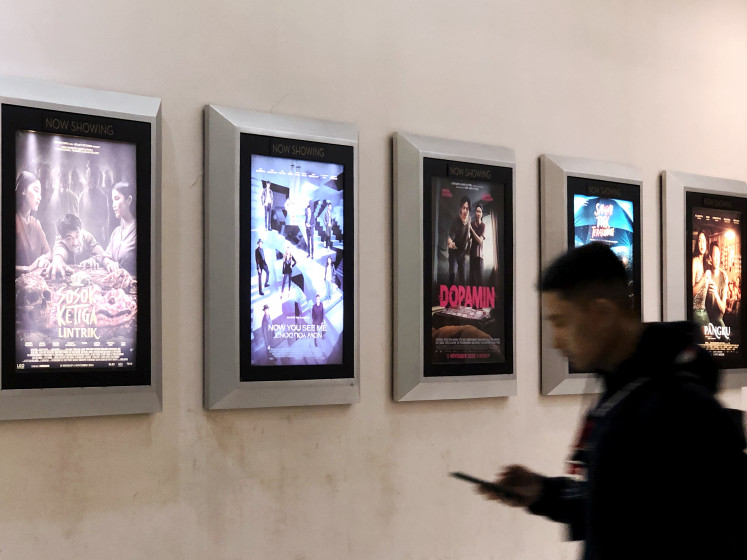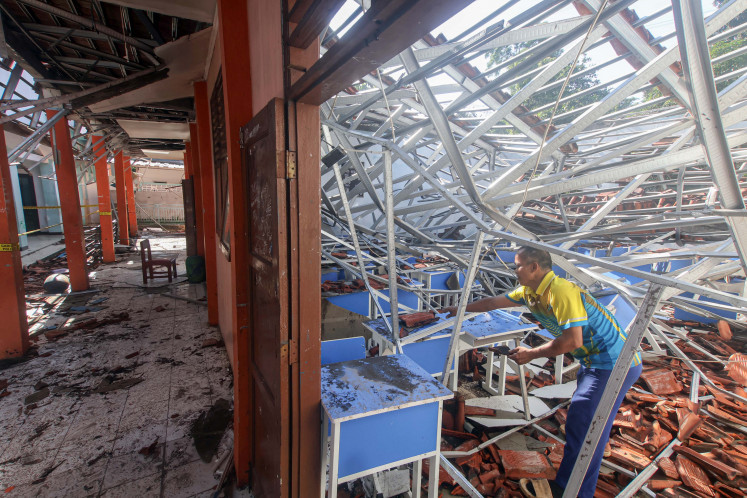Popular Reads
Top Results
Can't find what you're looking for?
View all search resultsPopular Reads
Top Results
Can't find what you're looking for?
View all search resultsDefense Ministry needs vision for military procurement
Final countdown: Air-ground officers at the Iswahjudi Air Force Base in Madiun, East Java, check locally made missiles for an F-16 jet fighter prior to an exercise
Change text size
Gift Premium Articles
to Anyone
F
inal countdown: Air-ground officers at the Iswahjudi Air Force Base in Madiun, East Java, check locally made missiles for an F-16 jet fighter prior to an exercise. Indonesia aims to boost the national defense industry to meet its minimum essential force. (JP/Wahyoe Boediwardhana)
Improving defense capability is more than about adding to the number of military platforms, but also about possessing the proficiency to utilize those cutting-edge tools. In addition, the Defense Ministry must play a greater role in guiding Indonesia’s procurements to ensure the efficacy of any additional platforms.
The recent skirmish with Chinese vessels around the Natuna Islands indicates the growing need for such a role by the ministry as guarding Indonesia’s vast maritime domain requires cooperation from various services, notably the Navy and the Air Force. A proper procurement vision from the ministry should be the basis for smooth inter-services military platforms interoperability. Furthermore, the Natuna case is a reminder for Indonesia to prioritize the rejuvenation of the Navy and the Air Force, since the two services possess the ability to reach the outer islands efficiently.
The government has announced the 2020 defense budget, which will increase by about 17.5 percent to Rp 131.2 trillion (US$9.4 billion) from this year’s mark. Defense Minister Prabowo Subianto said the ministry would improve the Indonesian Military (TNI) and provide adequate funds for the purpose.
Meanwhile, the Minimum Essential Force (MEF) program, aiming to modernize Indonesia’s military platforms, is entering its third and final phase (2019 to 2024). However, as a recent article in The Jakarta Post noted, the rising defense budget only allocated a small percentage for research and development but designated about 40 percent for manpower. This would have several consequences.
First, Prabowo’s intention to make the Defense Ministry a revenue generator will give the ministry little power in guiding the procurement process. Prabowo aspires to treat defense as an investment, as if in line with President Joko “Jokowi” Widodo’s intention of boosting Indonesia’s economy via trade and investment. Prabowo is also tasked to renegotiate the long-overdue jetfighter joint-production project with South Korea. Completing the deal will certainly provide Indonesia not only with sophisticated jetfighters, but also mastery of cutting-edge aircraft technology.
During the latest ASEAN Defense Ministers’ Meeting, the minister expressed an intention to strengthen defense ties with Malaysia, the United States and India. Prabowo also promoted local defense companies, particularly PT Pindad, to his ASEAN counterparts.
While such efforts may foster national defense industry development, it should not be the ministry’s primary objective; the Defense Ministry must play a guiding role in military platforms procurement. Ensuring interoperability between services is one example. The ministry can also help the TNI avoid a logistical nightmare for platform maintenance by synchronizing the acquisition plan and TNI’s logistical support capability. Assertion of this function by the Defense Ministry also signals an effort to establish firm civilian control over the military.
Next, the budget allocation trend indicates a continuation of Army-centric dominance within the armed forces, which does not support Jokowi’s maritime vision, as development of naval and air power would gain less focus than that of the land forces. Additionally, Prabowo wishes the TNI to tackle internal security threats, particularly in Papua, which would certainly maintain the Army’s central position over the Navy and the Air Force.
Another implication is the dwindling innovation opportunities, given the few funds for research, in producing new defense technology. In 2012, then-president Susilo Bambang Yudhoyono’s administration established an important foundation to improve the national defense industry through Law No. 16/2012 on the defense industry. Among other things the law mandated that military procurement must contain countertrade and local components. Adequate research and development funds would enable Indonesia to ultimately produce sophisticated armaments or other defense products.
Meanwhile, the government has only managed to fulfill about 66 percent of the MEF target, less than the expected progress of attaining 72 percent completion by 2019. The authorities also need to focus on neglected issues such as ensuring a big enough operational budget to give more TNI personnel more training hours with new equipment.
Next, achieving combat readiness must be a priority for the military, which can be done through regular exercises, joint training with other TNI services to improve interoperability and joint exercises with foreign counterparts that could provide new knowledge of military platforms operations, particularly with countries operating the same armaments. Moreover, such activity can serve as a confidence-building measure. The TNI can also use the opportunity for defense diplomacy.
Furthermore, although the 2012 Defense Industry Law established the paramount foundation of improving Indonesia’s strategic industry, the sector still requires much government support. Even if Indonesia’s defense companies can manufacture armaments, competing with established international defense corporations will be tough business. Therefore, national defense companies should look for alternatives.
For example, local strategic industries can aim to master logistical and maintenance support proficiency, which the TNI badly needs.
In conclusion, ensuring an adequate daily operational allowance and designating sufficient platform acquisition spending must be among the top priorities to improve defense capability.
As many experts have warned, acquiring new technology via platform procurement does not automatically guarantee mastery of the machinery. Proficiency can be attained via maintaining regular exercises through trial and error.
___________
Visiting fellow at the Indonesia Program, S. Rajaratnam School of International Studies, Nanyang Technological University, Singapore










